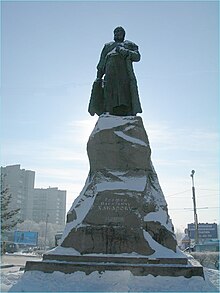Yerofey Khabarov
| Yerofey Khabarov Ерофей Хабаров |
|
|---|---|

The monument to Yerofey Khabarov in Khabarovsk
|
|
| Born | c. 1603 Kotlassky District in Arkhangelsk Oblast |
| Died | 1671 Bratsk or Kirensk in Irkutsk Oblast |
| Nationality | Template:Russian tsardom |
Yerofey Pavlovich Khabarov or Svyatitsky (Russian: Ерофей Павлович Хабаров (Святицкий) Yerofej Pavlovič Habarov (Svjatickij); the first name is often spelled Ярофей (Yarofei) in contemporary accounts; 1603 – after 1671), was a Russian entrepreneur and adventurer, best known for his exploring the Amur river region and his attempts to colonize the area for Russia. For background see Russian-Manchu border conflicts.
The major Russian city of Khabarovsk, as well as the small town and railway station Yerofey Pavlovich (located on the Trans-Siberian railroad in Amur Oblast) bear his name.
A native of the Veliky Ustyug area in the northern European Russia, Khabarov was a manager for the Stroganovs at the saltworks in Solvychegodsk. In 1625, Khabarov sailed from Tobolsk to Mangazeya. Three years later, he left the town with his expedition and reached the Kheta River (eastern part of Taimyr). In 1630, Khabarov took part in a voyage from Mangazeya to Tobolsk. In 1632—1641, he reached the Lena River and founded a farming settlement with saltworks along the Lena at the mouths of the Kuta and Kirenga Rivers. Now his descendants live in Stavropol.
In 1649 he became the second Russian to explore the Amur after Vassili Poyarkov (1643–1646). Poyarkov's route up the Aldan River was too difficult to be practical. At some point Khabarov attempted to reach the Amur via the Vitim River. In 1647 a hunter returned to Yakutsk from the Olyokma River and reported that this might lead to the Amur. In the spring of 1649 Khabarov set off at his own expense up the Olyokma River, then its branch, the Tungur and portaged to the Shilka River. Reaching the upper Amur (Dauria) in early 1650, he found the country nearly deserted, the cossacks' reputation having preceded them. Having pioneered a good route, he returned to Yakutsk in May, 1650 and gave his report. He praised the land, warned of the danger of Chinese intervention and suggested a larger expedition with professional soldiers.
...
Wikipedia
